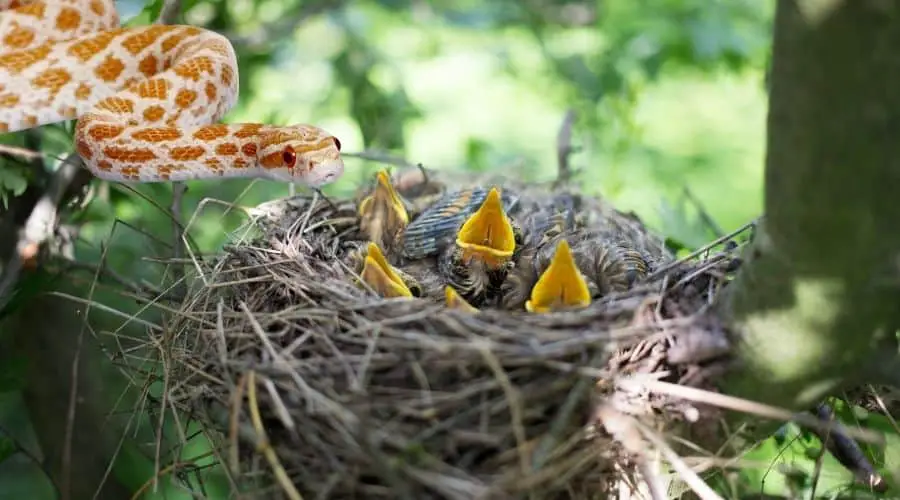There is a type of snake that can fly. The Chrysopelea paradisi can grow up to four feet long, and they can glide a surprising distance between trees. This ‘flight’ is so controlled they can even change direction mid-air.
Though it sounds like a terrifying hunting method, mostly, they use this trick to escape. If they don’t have wings, how do snakes find bird nests?
Snakes find bird nests by looking for visual cues that show a nest is around. Snakes watch birds go to and from a nest from the ground and by climbing trees. They will also spot bird droppings on the ground. Snakes rarely raid birds’ nest during the day when they are easy to spot but wait until night to attack the nest.
Table of Contents
How Do Snakes Locate Bird Nests
Snakes are clever creatures that know how to locate bird nests by looking for signs of their prey. They may not be as bright as dolphins and parrots, but these reptiles know a fair few tricks for surviving and thriving.
For example, they rarely raid bird nests during the day when they are easy to spot and chase but wait until it is dark and the parent birds are sleeping to slip inside.
By being patient, they can decrease the chances of getting seriously injured.
Snakes Can Locate Birds Nests By Climbing Trees
Animals with legs and claws climb by latching onto trees and pulling themselves upward.
Since snakes don’t have legs or claws, they have to climb by gripping the trunk with their lower body and working their way up by wrapping their upper body around to grasp, then pulling the rest upward and repeating the process.
Like other animals, snakes are safer away from their predators, and there are plenty on the ground to eat them.
Once the snake gets up to the tree, they can look around or smell out their food.
According to Animals Mom, “The forks on a snake’s tongue are designed to fit into two holes in the roof of his mouth. These holes access the Jacobson’s organ… Once the scent particles are passed from the forks of the snake’s tongue into the Jacobson’s organ, the chemical compounds are processed, and the sensory analysis is transmitted to the brain.”
This odd tongue-smelling is highly accurate and a great way to find prey.
Snakes Spot Bird Nests By Watching The Birds
When you see a lazy snake sunning itself on a rock to warm up, it may seem like they’re doing nothing.
However, besides providing necessary warmth to their cold-blooded bodies, those sunbathing snakes may be observing their next meal.
In the daytime, birds have little to fear from an obvious snake that isn’t moving toward their home.
Moreover, some birds are large enough to fight a snake and win, or at least hurt it enough to make it leave. Sadly, for the birds, snakes don’t necessarily hunt strictly during daylight hours.
A bird’s chances against a snake go down significantly after dark, especially if it’s venomous. Snakes can afford to be patient and enjoy the sun.
Plus, snakes don’t have great vision, so it may take a while to be sure a distant bird is going home to a nest.
How Do Black Snakes Find Bird Nests
Black snakes find bird nests like other species. In particular, it is much easier for a snake to find a nest where the young have hatched than where eggs are still being incubated.
Naturally, this is because there’s a lot more activity going on. You don’t need excellent vision to tell that a mother bird goes in and out of the same tree fifty times a day.
Do Snakes Attack Bird Nests
Not only will snakes attack birds’ nests, but they wait to do so until after dark. Catching the birds off guard when they’re sleeping is a great way to have a relatively easy meal.
A large number of birds’ nests don’t survive due to nocturnal predators like snakes.
How To Keep Snakes Out Of Bird Nests
One of the best ways to keep snakes out of your local bird nests is by simply cleaning up. Keep your lawn trimmed, and cut bushes, so there’s no low ground cover.
Snakes prefer to approach unseen whenever possible. Move any trash or debris and keep woodpiles and similar hiding spots away from your trees.
Are Snakes Attracted To Bird Houses
Snakes are often attracted to areas with birdhouses, but not always for the reason you might expect.
A snake will happily eat eggs, but a birdhouse is a source of fresh eggs just once a year. However, birdhouses also attract rodents to steal birdseed.
Snakes go where the rodents go because they are an excellent, self-replenishing source of food. Mice, rats, and other members of this family breed quickly, and they don’t have great defenses.
As a result, a birdhouse is doubly tempting for the hungry snake because it can smell the birds and eggs that live there, but it can also tell if more stable rodent-based food sources are lurking in the area.
How To Keep Snakes Out Of Bird Houses
There are several ways to prevent snakes from getting into your backyard birdhouses. Fortunately, while snakes like eggs, they are rarely a primary food source.
Here are 4 easy methods to keep snakes out of bird houses:
- Keep the rodents away from your birdhouse. You can use metal collars to help keep rats, mice, and squirrels from accessing your birdhouses easily.
- Pick a good snake guard. This netting helps keep snakes from ever reaching the tree or pole they need to climb. Instead, they get tangled up and trapped, leaving your birdhouse safe for the birds.
- Use a freestanding birdhouse. Rather than hanging your birdhouse in a tree or near bushes where the snake might have some cover to sneak in closer, put it on a high pole out in the open.
- Pick a highly effective snake repellant like Exterminators Choice Snake Defense Spray from Amazon. Not only is this easy to apply, but it’s safe to use around pets and children.
- Snake Repellent - Keep venomous and non-venomous snakes away from your home with Exterminators Choice Snake Repellent Spray; it works great on most common types of snakes such as Garter Snakes, Rattlesnakes, Copperheads, and many more
- Perfect for Indoors and Outdoors - Use the snake spray for eliminating pests from entering your home or kitchen near the doors and windows; also great for spraying around your garden, tool sheds, storage shed, patios, and lawns
- Non-Toxic Formula - Our snake deterrent features all-natural ingredients and no harmful chemicals, so it is safe to use around your pets and kids as you keep snakes out of homes, fields, and trash areas; ingredients include clove, cinnamon, and peppermint oil
- Easy to Use - To use, shake the snake defense spray well and apply a few spritzes using the included sprayer onto the designated area; for best results, apply when dry; the repellent will last 2 to 3 weeks, depending on weather conditions
- Long-Lasting - The reptile repellent for snakes comes in a large 1-gallon container (128 ounces) to ensure you have more than enough spray to last you a while; the handle makes it easy to store and carry for future use
Helpful Tips To Know About How Snakes Find Bird Nests
Snakes are excellent at hiding and waiting to strike. You can keep them out of birdhouses and nests by taking away their best options for hiding spots.
Here are more helpful tips to know about how snakes find bird nests.
- Rat snakes tend to live on the edges of forested areas where it’s easy to get plenty of sunlight. However, they head into the trees in the daytime to hunt.
- Black snakes are up to eighty percent more likely to get into a birds’ nest after dark than in the daytime.
- Snakes are opportunistic eaters, so they will eat birds, chicks, and even eggs if the opportunity arises.
Final Thoughts
Snakes rely on their senses to find birds’ nests. Sometimes the presence of very active birds, such as mothers with newly hatched young, will give away the location.
Other times they may sniff out the nest by droppings on the ground or even by getting lucky when they’ve climbed a tree to escape a predator.
Snakes use their incredible sense of smell most of the time, but even their limited eyesight and hearing can sometimes help them locate a nest. Unfortunately for birds, they are not usually stealthy when they’re at home.


